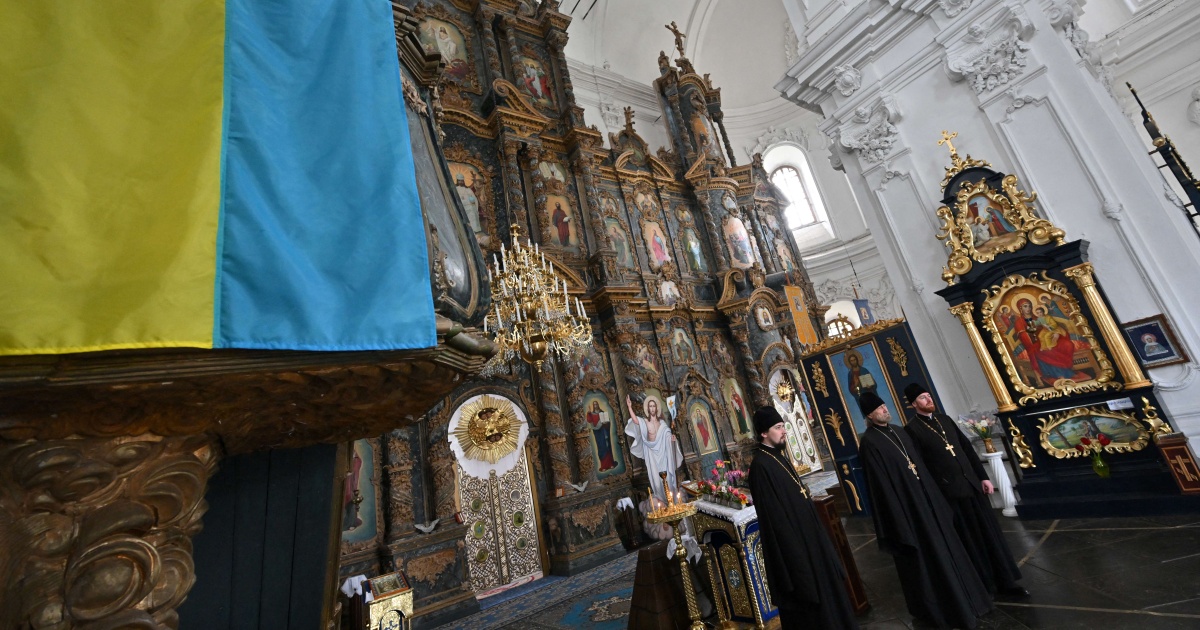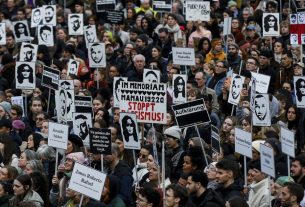(Kyiv, October 30, 2024) – Ukraine’s new law banning religious organizations with ties to the Russian Orthodox Church is overly broad and could have far-reaching consequences for Ukrainians’ right to religious freedom, Human Rights Watch said today. The law could effectively ban congregations of the Ukrainian Orthodox Church, Ukraine’s largest religious body.
The law, adopted August 20, 2024, prohibits the Russian Orthodox Church from operating in Ukraine and bans any religious organization in Ukraine with ties to it or any other religious organizations based in countries “engaged in armed aggression against Ukraine.” It authorizes the State Service of Ukraine for Ethnic Policy and Freedom of Conscience to identify links between Ukrainian religious organizations andthe Russian Orthodox Church. If found to have links, anorganization would have nine months to sever them,otherwise the agency can petition a court to shut it down.
“Ukrainian authorities understandably want to address state security concerns in the context of Russia’s brutal invasion of Ukraine,” said Hugh Williamson, Europe and Central Asia director at Human Rights Watch. “But the law interferes with the right to freedom of religion and is so broad that it could violate the rights of Ukrainian Orthodox Church members.”
The Ukrainian government should suspend implementation of the law and request the Venice Commission, the Council of Europe’s advisory body on constitutional matters, and the Organization for Security and Co-Operation in Europe’s’ Office for Democratic Institutions and Human Rights to provide expert analysis of the law that would be the basis for its rights-respecting revision, Human Rights Watch said.
The Ukrainian Orthodox Church was established in 1990 as an autonomous branch of the Russian Orthodox Church, whose leadership supports Russia’s full-scale invasion of Ukraine. The Ukrainian Orthodox Church has repeatedly condemned Russia’s war, and in May 2022 took steps to ensure its independence and full autonomy from the Russian Orthodox Church. Yet, in January 2023, the State Service of Ukraine for Ethnic Policy and Freedom of Conscience found these steps insufficient, stating that the “status of the Ukrainian Orthodox Church as a structural subdivision of the Russian Orthodox Church… remains unchanged.”
The Ukrainian Orthodox Church exists alongside the Orthodox Church of Ukraine, which was established in 2019 under the Patriarchate of Constantinople. The law does not impact the Orthodox Church of Ukraine.
Ukrainian authorities should address any security concerns related to the activities of religious bodies or personnel that threaten state security, whether by individuals or specific religious communities, rather than effectively banning entire religious communities based solely on presumed affiliations with the Russian Orthodox Church, Human Rights Watch said.
Since the start of the full-scale invasion, Ukraine’s security service has initiated criminal proceedings against at least 100 clergymen, most affiliated with the Ukrainian Orthodox Church, on charges of “collaborationism,” treason, and“aiding the aggressor state.”
Broad implementation of the new law risks severe practical consequences for the Ukrainian Orthodox Church’s congregations and millions of parishioners, Human Rights Watch said. They range from restrictions on ownership and operation of religious properties to difficulties in accessing places of worship and heightened risk of security service surveillance and prosecution.
Any prosecution or penalty not based on specific, unlawful actions but solely on the adherence to a peaceful practice of faith, constitutes religious discrimination and is prohibited by international human rights law.
In a written response to questions Human Rights Watch sent on October 2, the State Service of Ukraine for Ethnic Policy and Freedom of Conscience said that the law’s main objective is “to prevent the network of religious organizations officially registered in Ukraine from being used against Ukraine.”
The agency said that Ukraine “does not demand that the Ukrainian Orthodox Church betray the doctrine of the Orthodox Church, change liturgical practices or language, switch to a different liturgical calendar, or join another church jurisdiction. The only requirement that the Law insists on is withdrawing from the Russian Orthodox Church, which is involved in the war against Ukraine.”
The agency also shared recommendations on measures that could be taken to cut ties with the Russian Orthodox Church. It said it would develop regulations to implement the law within three months of its publication, to be approved by the Cabinet of Ministers of Ukraine.
The law considers any ties, not just institutional and organizational, but also canonical, with the Russian Orthodox Church to be grounds for banning it.
Requiring the Ukrainian Orthodox Church to sever canonical ties may cast doubt on the legitimacy of its adherents’ religious beliefs, which the European Court of Human Rights has identified as a key element of the right to freedom of religion, Human Rights Watch said. An expert affiliated with the Ukrainian Orthodox Church told Human Rights Watch that it should be given sufficient time to explore the complexities of cutting canonical ties through seeking consensus within the orthodox community.
Archimandrite Cyril Hovorun, a Ukrainian professor of international relations and ecumenism, told Human Rights Watch that the law’s implementation could drive the approximately 10,000 Ukrainian Orthodox Church congregations across Ukraine underground, forcing them to practice their religion in secrecy. He noted that there are Ukrainian Orthodox Church congregations in occupied territories that “refuse to join the Russian Orthodox Churchfor many reasons.” He said that the ban would sever the connection with those churches, and that the “Russian Orthodox Church will put their own people in place and that will be the end of it.”
The United Nations Human Rights Monitoring Mission in Ukraine has documented multiple incidents in which groups of people forcefully entered churches belonging to the Ukrainian Orthodox Сhurch, “justifying their actions with decisions from local authorities to register new religious communities of the Orthodox Church of Ukraine at the same address as existing Ukrainian Orthodox Churchcommunities.” In September, Ukraine blocked the website of the outlet DialogTUT, which covered Ukrainian Orthodox Church activities.
Ukraine is obligated under Ukrainian and international law to guarantee religious freedom. The European Convention on Human Rights, to which Ukraine is a party, guarantees in article 9 religious freedom, which includes the right both to hold a particular religious belief and to manifest it, either alone or in community with others and in public or private. Any limitations on this right must be necessary for a stated purpose such as the protection of public safety, public order, or the rights and freedoms of others, be proportionate to that aim, and be supported by sufficient and relevant reasons.
The International Covenant on Civil and Political Rights, to which Ukraine is also a party, similarly guarantees the right to freedom of religion (article 18) and provides that “No one shall be subject to coercion which would impair his freedom to have or to adopt a religion or belief of his choice.”Governments are explicitly prohibited from derogating from, or partially suspending, the right to freedom of religionprotected under the Covenant, even in times of public emergency.
The European Court of Human Rights has held that government measures that are liable to have negative repercussions on the exercise of religious freedom by the adherents of a particular church or faith–such as banning or dissolving that church—must be “supported by evidence of specific acts liable to pose a threat to public order or to the interests of others”; “must avoid casting doubt on the legitimacy of the beliefs in question”; and “must remain proportionate.”
“Ukrainian authorities are within their right to investigate and prosecute any individual, regardless of their religious affiliation, when there is credible evidence to indicate their specific actions are illegal and pose a threat to public safety and state security,” Williamson said. “However, religious affiliation on its own can’t be considered such evidence.”



